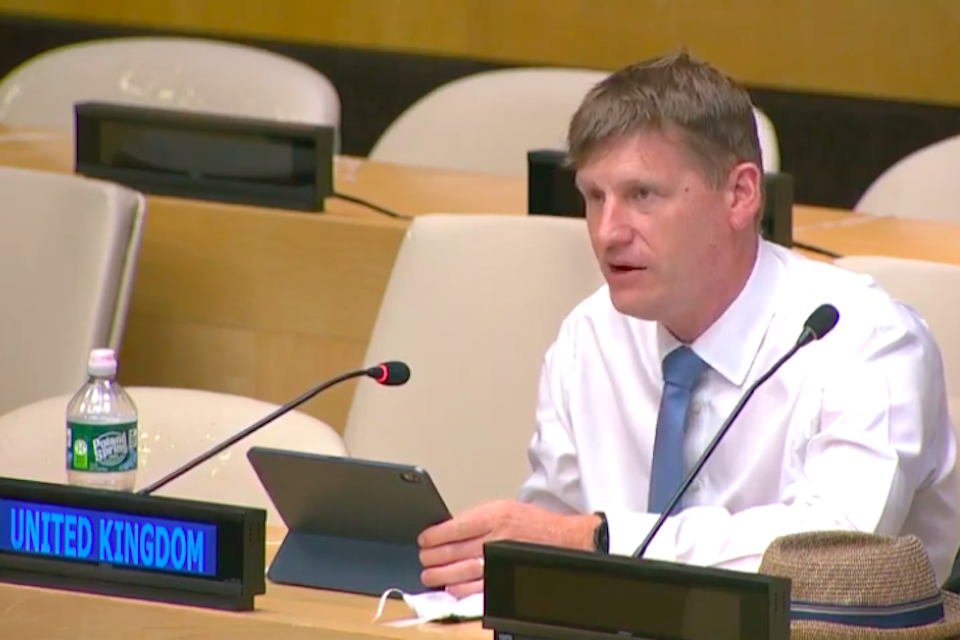Preventing famine and ensuring unrestricted humanitarian access in Yemen
Statement by Ambassador Jonathan Allen, UK Chargé d’Affaires to the UN, at the Security Council briefing on the humanitarian situation in Yemen.

Well, thank you, Mr President, and thank you to all our briefers.
The United Kingdom is extremely concerned that COVID-19 is compounding an already devastating humanitarian situation in Yemen. The officially reported cases don’t represent reality. Modelling shows that in a worst case scenario, 85,000 Yemenis could die. We are frustrated that the Houthis in particular are not reporting cases, have resisted implementing many mitigation measures and are preventing critical health activities from taking place, including vaccinations. And we call on all Yemeni parties to ensure unrestricted humanitarian access, report cases transparently and facilitate the United Nations’ response.
I’m extremely concerned that the recent food security assessment for southern Yemen projects 1.2 million more people will be facing food insecurity this year and note that the Houthis have obstructed the assessment in the north. This situation is driven by economic contraction. Yemen’s currency is continuing to depreciate to staggering new lows this year, with food prices rising by over 10 percent in June alone. Let us be frank with each other. Famine is now a realistic prospect, as Mark Lowcock has made only too clear. And as we have heard, this will disproportionately hit those who are already marginalised, particularly persons with disabilities.
There are two key actions the international community can take to prevent a disastrous famine being realised in Yemen this year. First is to urgently provide significant funding to the United Nations humanitarian appeal. The United Nations has only received $800 million this year, compared to $2.6 billion dollars at this point last year. This gap is hindering, crippling the humanitarian response, with 12 of the United Nations major 38 programmes already forced to scale back, including for food assistance. In response, the United Kingdom has already disbursed over 50 percent of our 160 million pounds - that’s $200 million dollars - of funding in Yemen this year. We urge all donors now to step up and provide significant humanitarian funding to the UN.
The second action is to provide financial assistance to the Central Bank of Yemen so it has sufficient hard currency to sustain food imports. This will be decisive to prevent a further collapse of household incomes and to stabilise prices.
The Government of Yemen has a role to play here. We call on them to develop a credible and transparent plan that reassures donors and includes the payment of public salaries.
The United Kingdom is responding through that $200 million funding commitment to the UN this year. We expect to provide over 700,000 medical consultations for a range of health conditions; train 1,500 health care workers to work safely in a COVID-19 environment; provide a much needed boost to nearly 600 health centres to continue providing existing health services.
We’re also extremely concerned about the developing threat from desert locusts. We understand that favourable breeding conditions have been existing thanks to heavy rain. There needs to be access to evaluate the options, including spraying, to mitigate this problem. And the impact will be severe not only in Yemen, but potentially also across Africa and in Asia. And we would welcome any update that Mark can provide in closed consultations.
Mr President, the risk of famine makes it ever more important that the Yemeni parties make the necessary compromises to urgently agree a nationwide ceasefire and a comprehensive political process to end the war for good. Whilst negotiations continue, the Houthis’ offensive on Ma’rib and cross-border attacks in Saudi Arabia have provoked an escalation in conflict. This behaviour has cast doubt over their intentions and the escalations have resulted in civilians dying in missile and air attacks. The Houthis must cease such provocations.
I welcome the close coordination of Security Council members both here and in the region in their support to Special Envoy Martin Griffiths. We must remain resolute and unified in our message to the Yemeni parties, to all Yemeni parties: now is the time to cease hostilities and agree to the proposals on the table.
There was a welcome announcement this week that the Saudi mediation has led to renewed impetus to implement the Riyadh Agreement. I must stress the importance of swift implementation, including the formation of a joint delegation for the UN-led peace process.
This month in the Council we also focussed on the devastating impact of an oil leak from the SAFER tanker, as set out earlier by Mark Lowcock. Although the Houthis repeatedly agreed in principle to UN assistance, they have proved unwilling to take it forward in practice, instead imposing preconditions and linking it with other issues. After 14 days, the experts’ visas have not been approved. The Houthis momentarily approved them, only to cancel them the same day, claiming that was done in error. I urge the Houthis to facilitate the experts in that work. Anything less is extremely reckless.
Let me conclude, colleagues, by echoing Martin Griffiths’s warning over negotiations slipping away from us. It must be a clear expectation of all of us in this Council that we expect the Yemeni parties to resolve the outstanding issues swiftly and come to a ceasefire and a political process. And let us all resolve to use all the tools at our disposal to achieve them.
Thank you, Mr President.